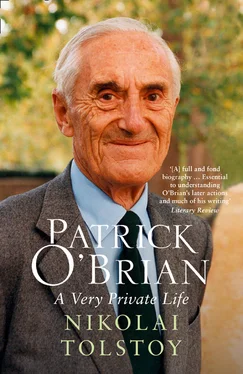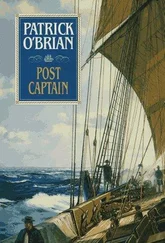Despite his continuing ill-health and exhaustion, Patrick plunged back into his neglected writing. The holiday had been a brilliant success – if dangerously expensive. There remained but 55,000 francs (about £50) in their account. Nevertheless, he and my mother had decided that Richard, being now fourteen, should receive a quarterly allowance to spend as he chose. ‘Yesterday P. told R. about his £52 a year: R. much impressed & so pleasant about it.’ Naturally he could have had little idea of the sacrifice involved. A week later my worried mother ‘Went to P[ort]. Vendres & paid tax. So depressed.’
During the remaining fortnight of the holiday, Richard spent his days swimming, playing tennis, watching the sardana danced in the square, attending divine service at the old church by the harbour, and revelling in my mother’s rich cooking. ‘Made enormous rice – moules & sèches & all. Mme Oliva made us an ailloli. Dear R. likes everything.’ He made friends with Odette’s young son Robert, and travelled one day to Perpignan to buy a new chain for Buddug; on another he went to Port Bou on a shopping exped ition with my mother: ‘pleasant morning’. Willy Mucha invited him to stay with them whenever he liked. He made friends on every side. There was work, too, for him and my mother. At dawn on 4 September they were invited to assist René Aloujes with his vendange. They toiled from 6 a.m. until 9, paused for a hefty breakfast until 10.30, and continued until noon: ‘R. worked very well. Grapes not very good. A very steep, difficult vigne to work.’
In the evenings after supper the three stayed up playing endless games of racing demon and ‘prawns’ eyes’, in the company of Buddug, Pussit, and a new member of the family: ‘Kitten comes in to play; a very good, clean kitten.’
Eventually, the sad day arrived for Richard’s departure on 7 September. He was given a lively send-off, loaded with exciting gifts. The garrulous Willy Mucha bustled up, bearing a dried flying fish as a parting token. Finally, ‘R. got 7 pm train, so sad P & I: the house is dreary.’
A few days later they were rewarded with a letter, bubbling over with enthusiasm:
Thank you very much for a wonderful holiday; the boys will not believe my experiences, especially the golden-eagles. What a good time we all had. Thank you so much.
Andorra was about the most marvellous country that I have ever been to. What fishing it was! What fun it was in the camp …
Very [ sic ] thing was in tact and whole when I got home: even to scorpion and flying-fish and mostofall my porron.[fn9] I have a huge collection now dominated by my banderilla. Every-body shrinks from the scorpion, believing it to be alive. My precious [Andorran] flag is now the envy of all the boys at school who are extremely jelous …
The whole form, one and all and dumbfounded when I produced the [clasp] knife.[fn10] One boy produced a ‘sharp knife’, he skinned his arm but did not cut hair, all he succeeded in was cutting himself.
In addition, Patrick had concealed a sophisticated fishing reel in his luggage at departure, which further excited his friends’ admiration. As Richard explained, this was ‘a pleasant and exciting surprise’, especially as ‘Finn and Atkins, both seized with fishing mania have reels, not of my superior type … I am very much envied in that way to.’
With the reticence characteristic of schoolboys in those distant unsentimental days, Richard omitted to report a distressing aspect of his otherwise triumphant return to Cardinal Vaughan School. As before, I am indebted to his friend Bob Broeder for this revealing account:
When we returned to school for the autumn term, our English teacher set us the task of writing a composition about what we did in the summer holidays. Most of us wrote the usual mundane contents but Richard wrote a masterpiece, describing his journey to the South of France and how he and his father met and spent some time with El Cordobes a renowned Spanish bullfighter.[fn11]
Having read it myself I admired his descriptive narrative, his English was marvellous, remarkable and interesting, his father had taught him well. The next time we had English, the teacher handed all the exercise books back to all the pupils except Richard. In front of the whole class the teacher made the announcement that he had asked for a factual essay, not an imaginary one – holding Richard’s up to the class. This, he declared, was the work of a fertile imagination without an ounce of reality. I stood up to protest – saying I had postcards to prove that in no way did imagination play any part in his beautiful essay but was told in no uncertain terms to shut up and to sit down, if I didn’t obey the outcome would be a trip to the Discipline master with the inevitable thrashing. It goes without saying that Richard was distraught and very angry. I clearly remember that both I and several classmates tried to console him but the anger had never left him during the rest of his time at the school. I remember his mother was also very upset.
Richard’s indignation was fully justified, but his exceptional capacity to harbour resentment may also be noted.
Back in Collioure, Patrick and my mother had resumed their daily struggle. There were compensations to their existence, however. Much of the physical structure of the town stems from medieval times, and among the population there breathed memories of a picturesque past. While most of the inhabitants are Roman Catholics, there has long been a sizeable Protestant minority, who congregate at their Temple above the Château Royal. Relations between these two branches of the Christian religion have traditionally long been cordial. The only hint of disparagement I heard of occurred in the name of a local pastry, known as a jésuite . Gazing through the window of the pâtisserie in the Port d’Avall, Patrick explained to me that when you bite into one – it proves to be hollow!
At the time he and my mother arrived in the town, there survived numerous customs and practices redolent of beliefs older even than the conversion to Christianity. Popular theology could be a trifle speculative – as this exchange recorded by my mother on May Day 1954 attests:
When I arrived at Mimi Choux’s this morning she was in the middle of condemning someone for stating that angels are bald. ‘N’est-ce pas, Madame O’Brian, que dans toutes les reproductions les anges ont toujours les cheveux bouclés?’[fn12]
A generally equable syncretism between the Church and pagan practices and beliefs survived locally well into the middle of the twentieth century. It was quite common for brides to appear in an advanced state of pregnancy at their weddings. ‘About the number of marriages with the girl pregnant’, my mother was told, it is ‘quite natural, people rigole [laugh] and joke but are not méchants with the girl; there is no onus [blame] on the man at all.’
A curious custom which might have suggested anticlericalism or simple hooliganism was evidently neither, and bore a significance now possibly lost:
Also asked Rimbaud about the bands of youths banging on curé’s door. He says it is ‘sans méchanceté’ & has always been done (he was v. active in his time) & nobody really minds. They bang on the doors of their young women. If dégâts [damage] result, complaints are made to mayor & youths pay up, but it doesn’t go to the police.
A practice of having a sprig of hawthorn blessed by the curé taken to the fields to ensure a good harvest presumably reflected the archaic folk belief that its prickles repel witches, ever prowling abroad with the malign intent of blighting the crops of honest Christians.[3]
Not all magic was benign, however:
Mme Rimbaud’s tale: yesterday, she alone in the house, a woman selling lace. I don’t want any lace. And why don’t you want any lace? Because I don’t want any lace. Then the woman said if she would not buy any lace, she, who knew how to tell the cards, would put a ‘malédiction’ on her. That evening she had such a head she did not know whether it was the result of the malediction, or what.
Читать дальше












